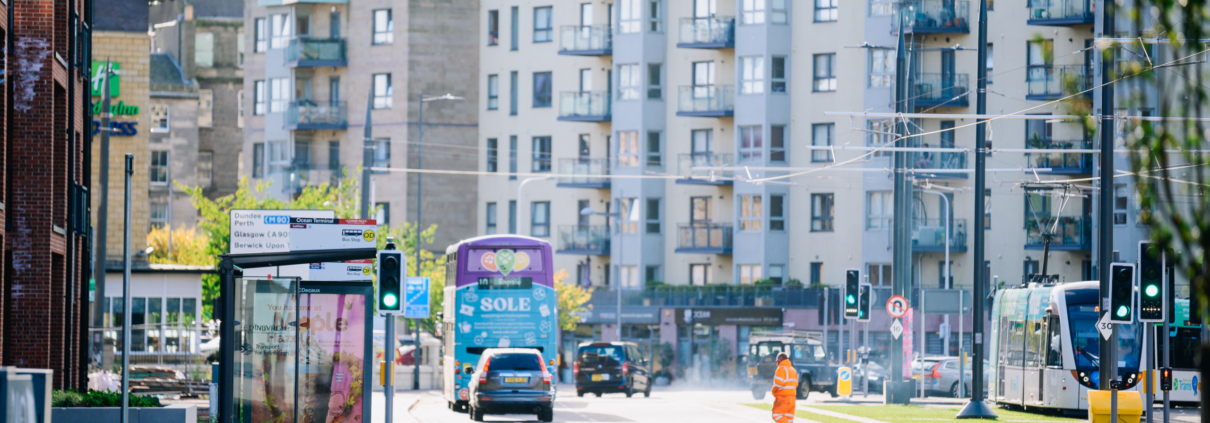Opportunity to unleash investment to decarbonise UK freight sector
An ambitious plan to decarbonise the UK’s road, rail and maritime freight transport is the subject of a new report involving a leading professor from Heriot-Watt University.
Released by the Decarbonising UK Freight Transport (DUKFT) Network, the Synthesis report has been three years in the making and compiled with a collection of more than 40 academics, policy and industry partners from across the UK.
Their focus has been to mobilise investment to enable the decarbonisation of the UK’s road, rail and maritime freight transport. Collectively these sectors represent nearly 7% of all UK CO2 emissions, fuelled by e-commerce demand and cheap transportation costs.
There remains a clear need for identifying and articulating the least-cost configuration and strategy for UK freight decarbonisation.
The document sets out a series of key findings, transition pathways and solutions to close the gaps in investment for each of the freight sectors as the UK works towards its net zero target for 2050.
Professor Phil Greening from Heriot-Watt University is co-director of DUKFT and Deputy Director of the Centre for Sustainable Road Freight, a joint initiative between Heriot-Watt, Cambridge University and the University of Westminster. He said: “There remains a clear need for identifying and articulating the least-cost configuration and strategy for UK freight decarbonisation.
“New Modelling approaches are required to address the challenges of simultaneous wholesale changes across all the transport modes. These models are sophisticated and take time to build but they are the only way of addressing complexity and they offer a low risk, cost effective pathway to reducing uncertainty and accelerating investment.”
Among its findings, the Synthesis report highlights electrification as a common need across all freight modes and considered a ‘no-regrets low-risk investment’ from both public and private investors. Renewable Fuels of Non-Biological Origin, such as hydrogen derived fuels, may be important for some road and rail freight but is expected to have a greater role in decarbonising domestic and international maritime freight.
It also states the UK’s freight decarbonisation strategy can be most efficiently advanced by encouraging investment from all parts of the whole freight system and establish a shared goal for decarbonisation.
Bringing stakeholders from across the supply chain together, including energy suppliers, port owners, vessel/vehicle owners, logistics companies, along with investors and financiers, is said to be crucial in establishing opportunities and creating a platform to mobilise infrastructural investment.
Dr Tristan Smith, Principal Investigator of DUKFT, Associate Professor at UCL, said: “The research has shown that when effort was invested to bring stakeholders from different parts of freight value chains together (industry, academia, NGO and government stakeholders), there was benefit to identify a shared vision and co-create ideas for both public and private actions aligned with unlocking investment in decarbonisation.”
Dr Nishatabbas Rehmatulla, Co-investigator and project manager of DUKFT, Principal Research Fellow at UCL said: “Early movers can mobilise and de-risk investment in the emergence phase of the transition by establishing alliances and initiatives, ahead of regulations.
“Alliances between cargo owners which aggregate local/regional demand for zero emission fuelled freight services, thereby creating long-term offtake agreements of future fuel usage between fleet operators and suppliers, can be highly valuable kickstart the diffusion of fuels and technologies.”
Decarbonising UK Freight Transport is part of the Decarbonising Transport Networks+ programme. This programme is funded by the Engineering and Physical Sciences Research Council (EPSRC), which is part of UK Research and Innovation (UKRI).
Heriot-Watt University and the University of Glasgow are leading a separate UK-wide consultation about how digital technologies can accelerate the decarbonisation of transport.
The Twinning for Decarbonising Project, or TransiT, will involve to creating digital twins of the UK transport infrastructure, which can be used to model different net zero scenarios.
Digital twins are sophisticated computer simulations of real-life objects, processes or systems which can help guide decisions about how their performance can be improved. This allows for rapid simulation of many alternative future scenarios to guide technology investments.
TransiT is supported by the Engineering and Physical Sciences Research Council (EPSRC), part of UKRI and the main funding body for engineering and physical sciences research in the UK.



